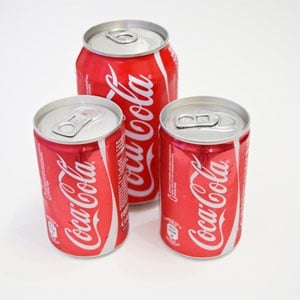
Coca-Cola is working with fitness and nutrition experts who suggest its soda as a treat at a time when the world's biggest beverage maker is being blamed for helping to fuel obesity rates.
Mini-can of Coke as a good snack
In February, several of the experts wrote online posts for American Heart Month, with each including a mini-can of Coke or soda as a snack idea.
The pieces – which appeared on nutrition blogs and other sites including those of major newspapers – offer a window into the many ways food companies work behind the scenes to cast their products in a positive light, often with the help of third parties who are seen as trusted authorities.
Read: Coke takes anti-obesity campaign global
Ben Sheidler, a Coca-Cola spokesman, compared the February posts to product placement deals a company might have with TV shows.
"We have a network of dieticians we work with," said Sheidler, who declined to say how much the company pays experts. "Every big brand works with bloggers or has paid talent."
Other companies including Kellogg and General Mills have used strategies like providing continuing education classes for dieticians, funding studies that burnish the nutritional images of their products and offering newsletters for health experts. PepsiCo Inc. has also worked with dieticians who suggest its Frito-Lay and Tostito chips in local TV segments on healthy eating.
Nutrition experts in sponsored content
Others use nutrition experts in sponsored content; the American Pistachio Growers has quoted a dietician for the New England Patriots in a piece on healthy snacks and recipes and Nestle has quoted its own executive in a post about infant nutrition.
For Coca-Cola Co., the public relations strategy with health experts in February focused on the theme of "Heart Health & Black History Month." The effort yielded a radio segment and multiple online pieces.
One post refers to a "refreshing beverage option such as a mini can of Coca-Cola." Another suggests "portion-controlled versions of your favourites, like Coca-Cola mini cans, packs of almonds or pre-portioned desserts for a meal."
The focus on the smaller cans isn't surprising. Sugary drinks have come under fire for fuelling obesity rates and related ills, and the last time Coke's annual U.S. soda volume increased was in 2002, according to the industry tracker Beverage Digest.
Read: Coke defends safety of aspartame
More recently, the company is pushing its mini-cans as a guilt-free way to enjoy cola. The cans also fetch higher prices on a per ounce basis, so even if people are drinking less soda, Coke says it can grow sales.
In a statement, Coca-Cola said it wants to "help people make decisions that are right for them" and that like others in the industry, it works with health experts "to help bring context to the latest facts and science around our products and ingredients."
It said any communications by the experts it works with contain the appropriate disclosures.
Most of the pieces suggesting mini-Cokes say in the bios that the author is a "consultant" for food companies, including Coca-Cola. Some add that the ideas expressed are their own.
Practitioners shouldn't mislead people
The Academy of Nutrition and Dietetics, a professional group for dieticians, says in its code of ethics that practitioners promote and endorse products "only in a manner that is not false and misleading". A spokesman for the academy, Ryan O'Malley, said he couldn't say whether the posts on mini-Cokes meet those guidelines because there is a formal process for submitting and reviewing such cases.
Meanwhile, a group called Dieticians for Professional Integrity has called for sharper lines to be drawn between dieticians and companies. Andy Bellatti, one of its founders, said companies court dieticians because they help validate corporate messages.
The message that Coke can be a healthy snack is debatable. A mini-Coke is 7.5 ounces and has 90 calories, all of it from high-fructose corn syrup. That's compared with 140 calories in a regular 12-ounce can.
Read: Coca Cola sued again for false advertising
Still, the health experts who wrote the pieces mentioning Coke stand by their recommendations.
Sylvia Melendez-Klinger, a dietician who wrote another piece mentioning mini- cans of soda, said it's important that health professionals share their expertise with companies and that her work reflects her own views.
She said she could not recall if she was paid for her article mentioning mini-sodas.
Read More:
Coca-Cola puts new sweetener in UK sprite
What’s SA’s most sugary drink?




 Publications
Publications
 Partners
Partners










